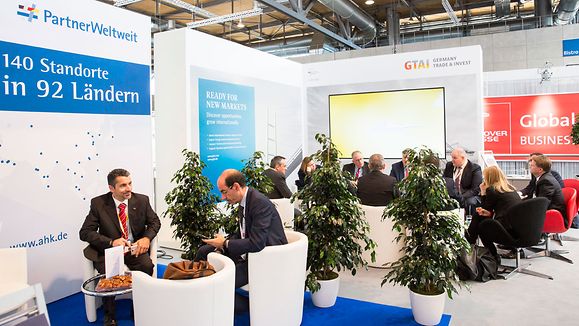private client market in Europe
Your company is already operating in Germany and you would now like to export worldwide?
Key Facts
Blockchain Facts & Figures
Europe’s Largest Private Client Market
A penetration rate of 35 percent for digital assets (cryptocurrencies, decentralized finance, non-fungible tokens) is above the EUR and global averages (32 percent and 12 percent respectively). As recently as 2023, this was at 24 percent in the country.German Company Digitalization Potential
Some 27 percent of companies are already using, planning to use or discussing the use of blockchain technology – this is a six percent increase on the 2023 level.Blockchain Investment Focus
Blockchain investments attract four percent of VC funding while 5.5 percent of all deals made in Germany involve blockchain start-ups – a disproportionately high level of funding compared to the share of blockchain start-ups in start-ups in general.Favorable Regulatory Environment
'Favorable regulations such as the law on electronic securities or the granting of licenses for crypto custody transactions promote the widespread acceptance of digital assets in Germany.Establishing Infrastructure
Many of the fundamental blockchain technologies and network infrastructures were developed in Germany. The country also operates the second largest number of bitcoin nodes in the world – demonstrating Germany’s open and pioneering blockchain technology position.
Opportunities
Growing opportunities in Germany’s Blockchain Industry
Transparency, Traceability and Information Security
Blockchain technology offers a wide range of possible applications – particularly for ensuring transparency, traceability and information security – and has great potential for cross-industry applications. Blockchain is already being used in all sectors in Germany, with large companies leading the way. The technology also offers considerable advantages for German SMEs who are more likely to engage in cross-company collaboration. Smart contracts enable business processes to be handled more efficiently, reduce transaction costs and increase the international competitiveness of Germany's export-oriented SMEs. In Germany, 73 percent of blockchain risk financing and 48 percent of deals in 2022-2023 were invested in sector-agnostic business models including blockchain networks, data management, verification and analytics, infrastructure, and developer tools. This illustrates the potential of blockchain technology as a key technology for the economy as a whole.
Industry Sectors
The number of companies in Germany already using or planning to use blockchain rose to 7.2 percent in 2024. One in five companies is already considering possible fields of application. Germany’s manufacturing industry is comparatively advanced when it comes to the use of blockchain: the frontrunner is the chemical industry where 14 percent of companies use the technology for their business processes. In the automotive industry, 13 percent of companies use blockchain technology. Blockchain technology is used by at least one in ten companies in the advertising and market research, logistics, IT service provision and consulting sectors.
Application Sectors
According to the 2019 Bitkom study, more than half of the companies surveyed with 50 or more employees use blockchain technology in accounting, finance and controlling. Around one third of these companies also use blockchain in logistics, warehousing and shipping. An analysis of blockchain job recruitment postings also indicates a wide range of applications for blockchain technology. Particularly noteworthy are planned applications in the areas of artificial intelligence, automation, the Internet of Things, cybersecurity and Web3 or tokenization of assets (non-fungible tokens).
Energy-intensive Industries
Beyond Industrie 4.0 and the financial sector, innovative blockchain applications are also emerging in the energy industry in particular. Some 80 percent of German companies active in energy-intensive industries see blockchain potential for their emissions, energy and sustainability management. Germany’s energy transition, ESG regulations and growing customer expectations of corporate social responsibility will strengthen significant blockchain potential.
Business Environment
The Business Environment for Germany’s Blockchain Industry Enables Growth
Investment Climate
Germany has been actively promoting the blockchain ecosystem and the use of blockchain technologies through its blockchain strategy since 2019. Several government-funded projects – including an energy database and a digital identity system – are in planning. The country has been promoting the adoption of blockchain financial innovations since 2020 through various laws including licenses for crypto custody transactions (2020), the Electronic Securities Act (2021) and the Future Financing Act (2024). The EU created a framework for the uniform treatment of crypto assets (MiCAR) in 2023. The introduction of the Markets in Crypto-Assets Regulation in Germany in 2024 has been accompanied by the Financial Market Digitization Act and the Crypto Markets Supervision Act in order to increase legal certainty and confidence in tokenized financial innovations and crypto markets.
Regulatory Environment
The German Games Industry Association (game) is an important institution that helps drive the games industry forward. Members represent the entire gaming ecosystem: from development studios and publishers to esports organizers, educational institutions and other organizations. As the co-organizers of gamescom, game is responsible for the world's largest computer and video games event. The association is shareholders in the USK, the Digital Games Culture Foundation, the esports player foundation, devcom, and the VHG rights management organization. Game also hosts the German Computer Game Awards. As a key contact for media, politics, and society, it addresses all of the questions related to market development, gaming culture and media literacy.
Knowledge Ecosystem Knowledge is being intensively built up to meet demand for qualified specialists. Universities are increasingly offering blockchain courses (such as the Master's degree course in blockchain and DLT at Mittweida University of Applied Sciences). There are also professional training courses at blockchain competence centers. Facilities such as the Fraunhofer Institute's blockchain laboratory support the transfer of research results to industry. Initiatives such as the Blockchain Expert Dialogue of the Federal Ministry for Economic Affairs and Climate Action, IDUnion and the Future Energy Lab demonstrate the increasing potential of blockchain technology for the German economy. Numerous associations and clusters such as the Blockchain Bundesverband, BerChain, Hanseatic Blockchain Institute, Blockchain.Europe.nrw, and BlockLAB Stuttgart are further strengthening cooperation between companies and scientific institutions.


